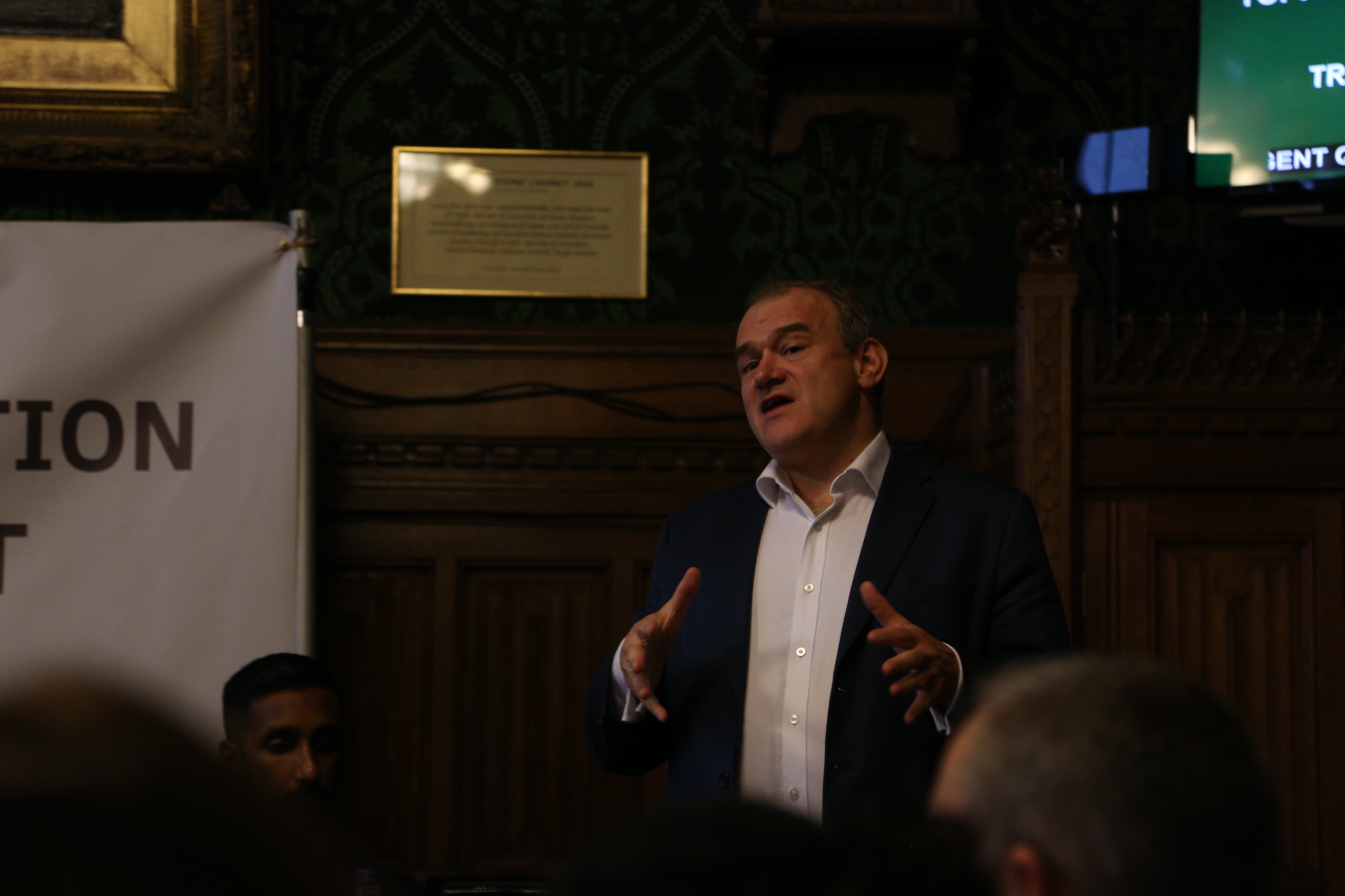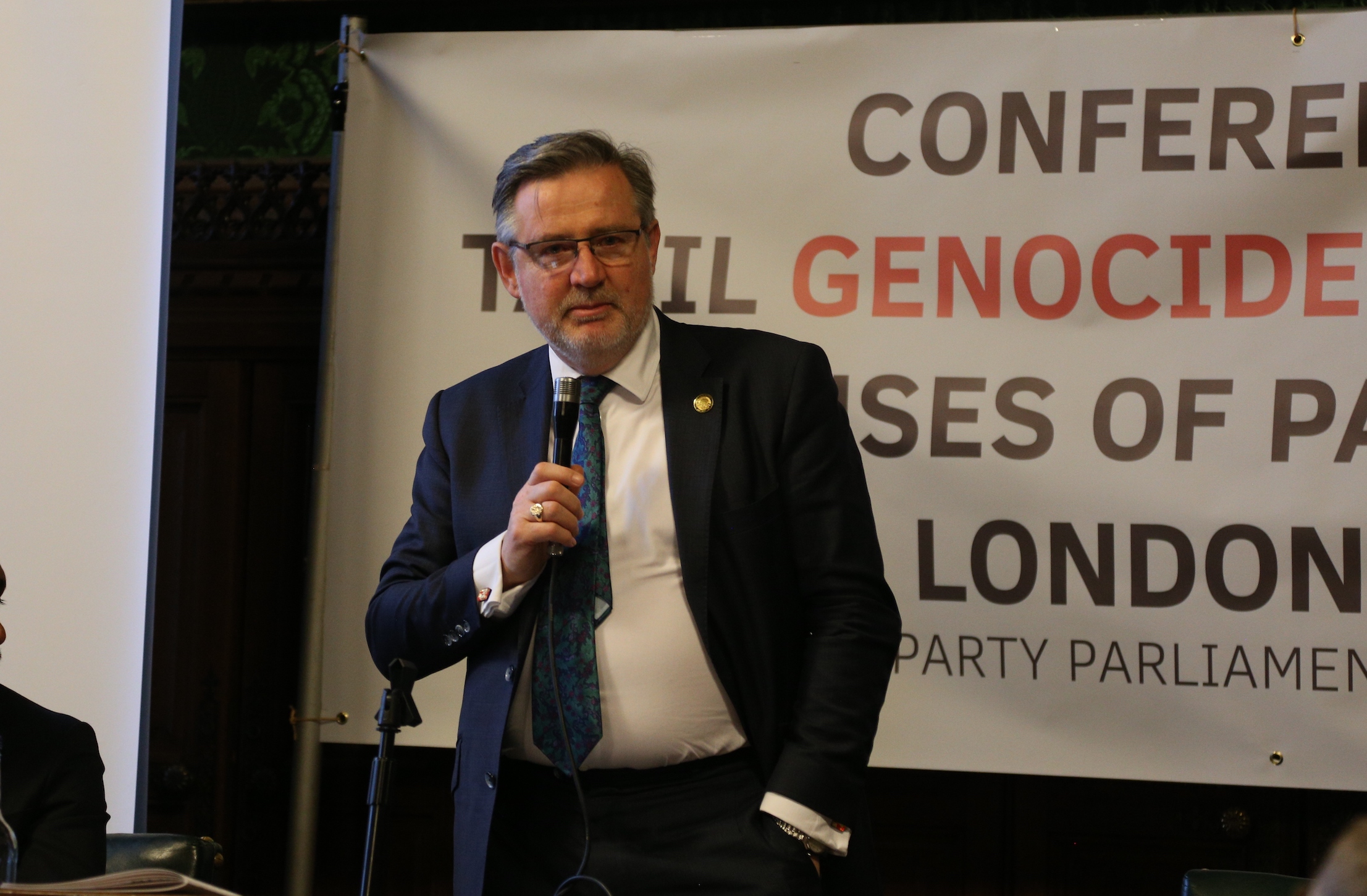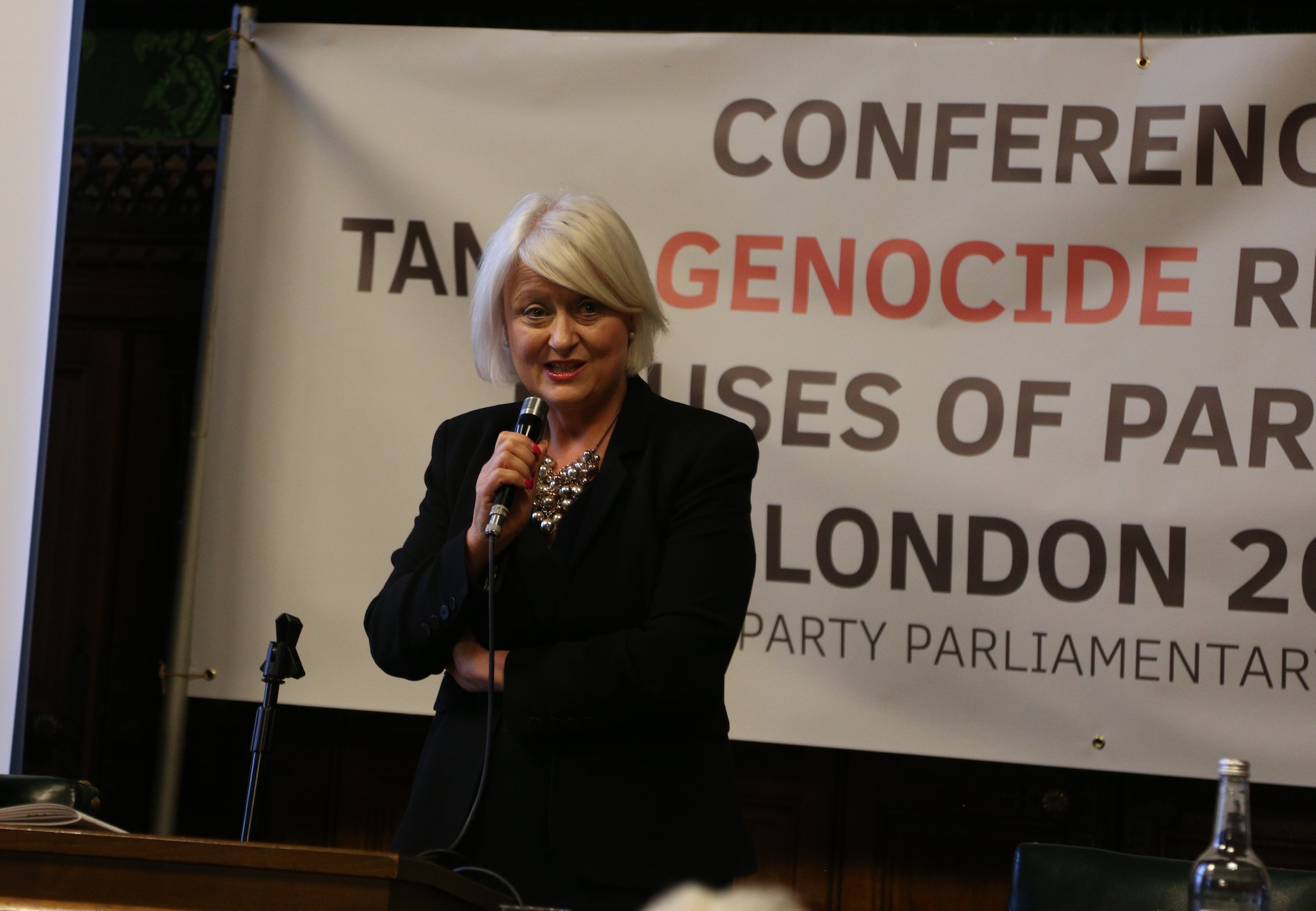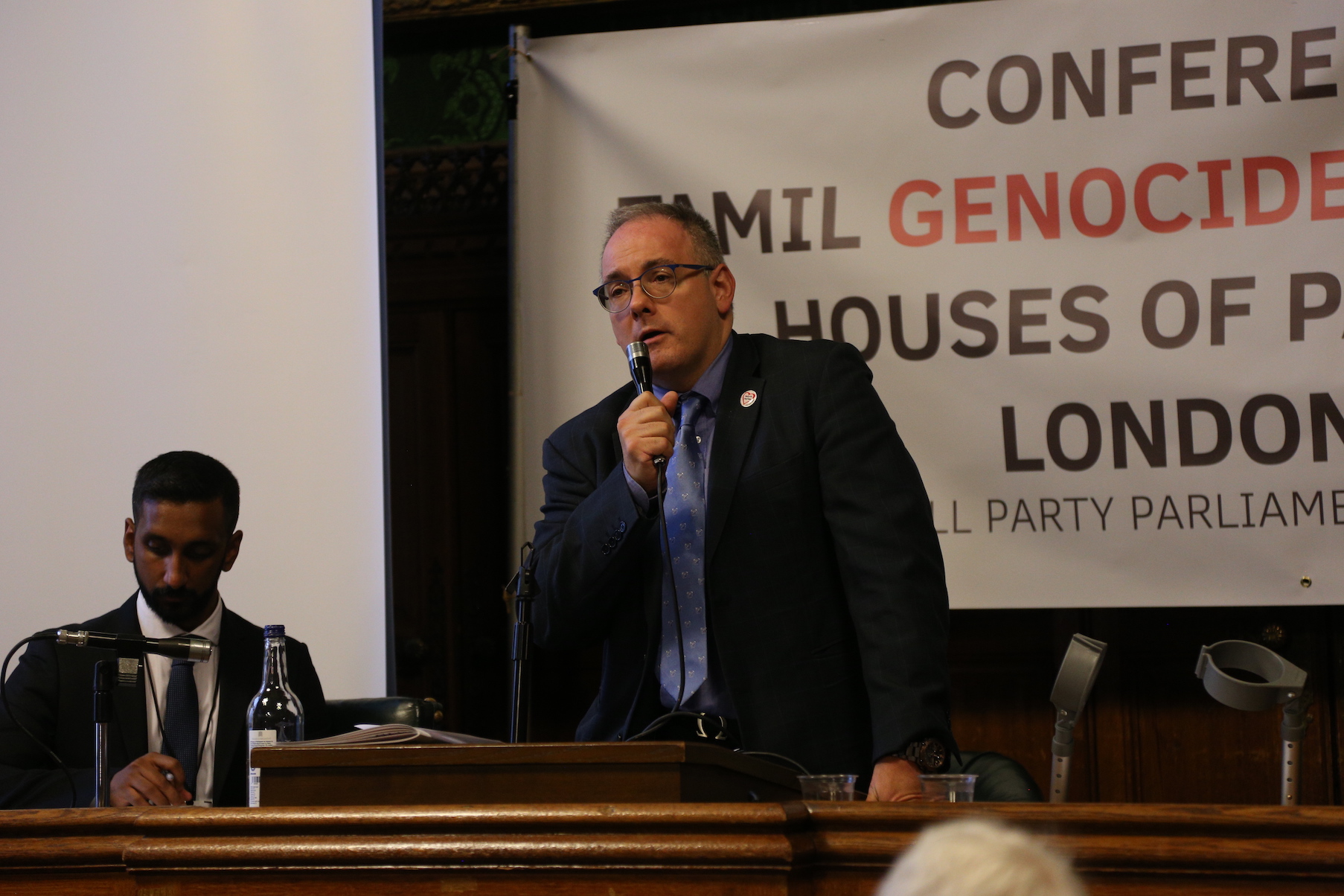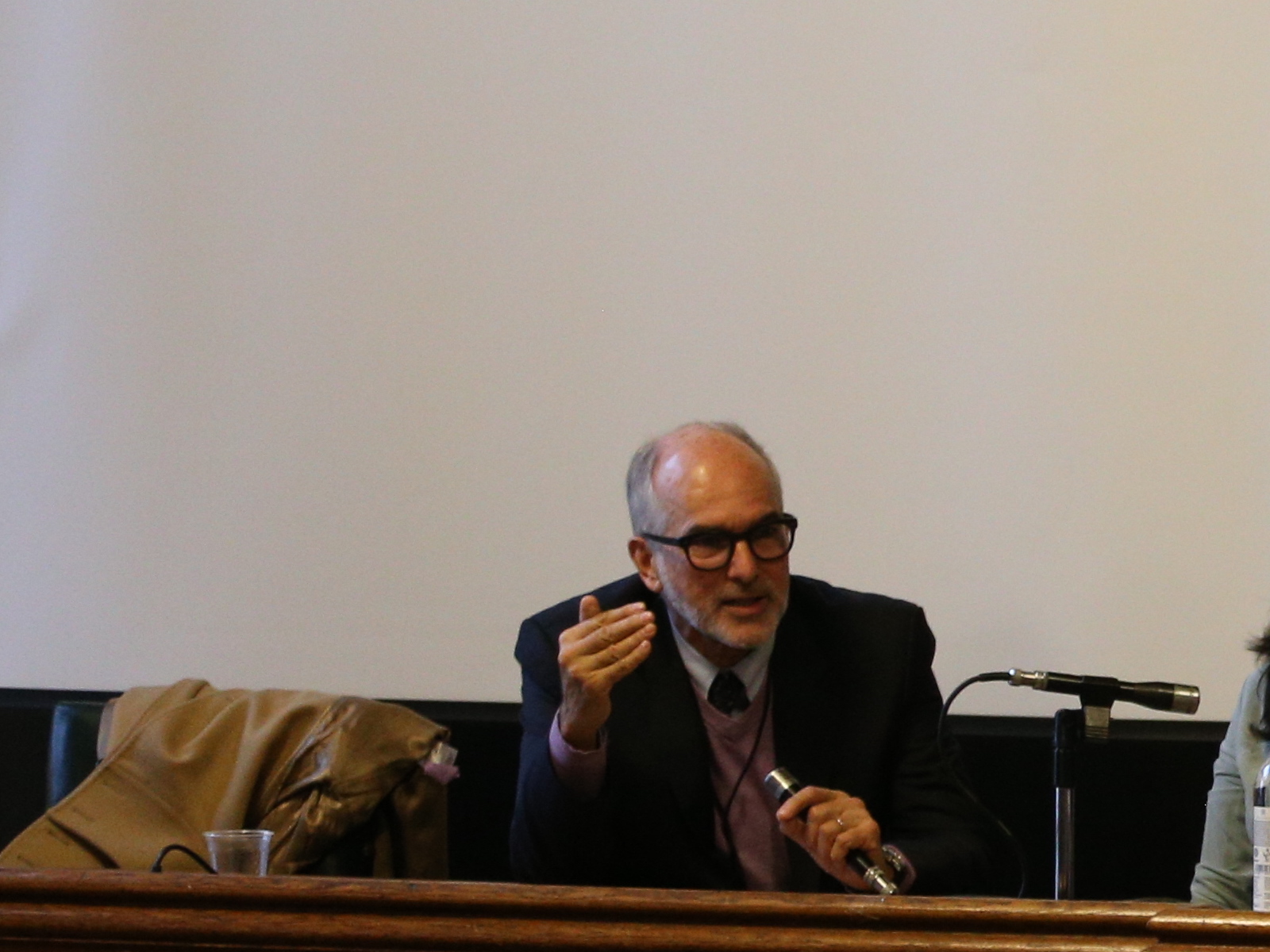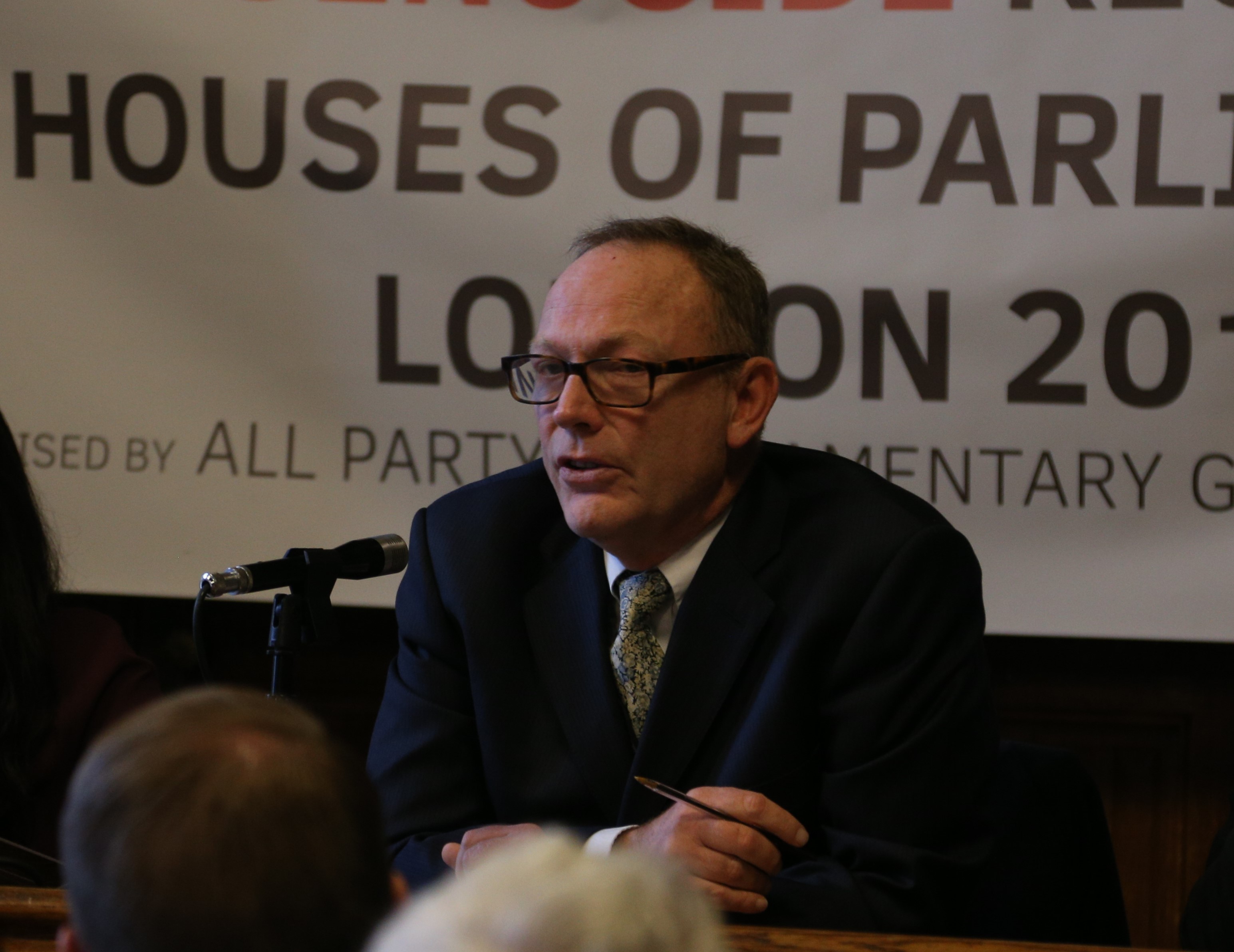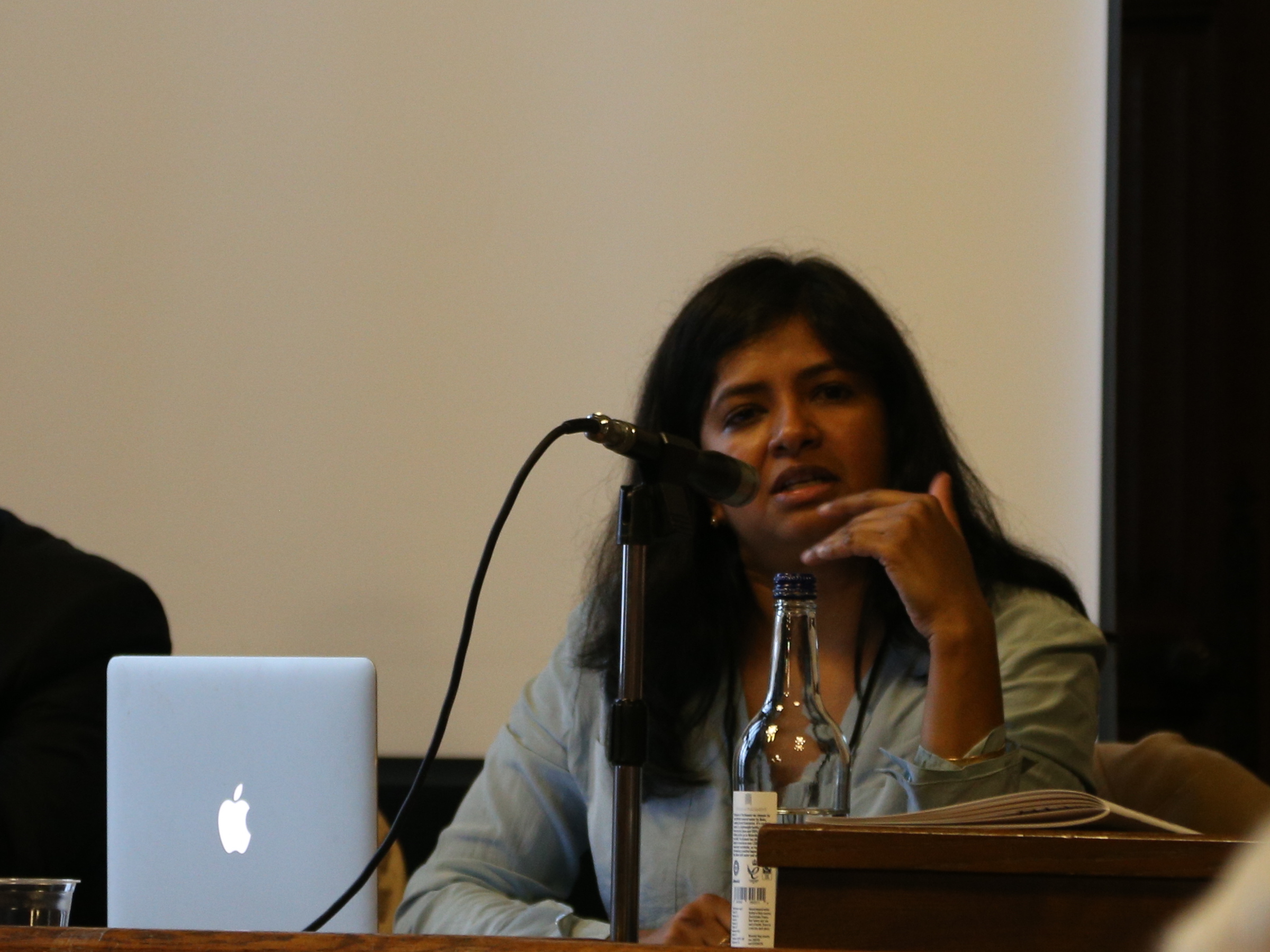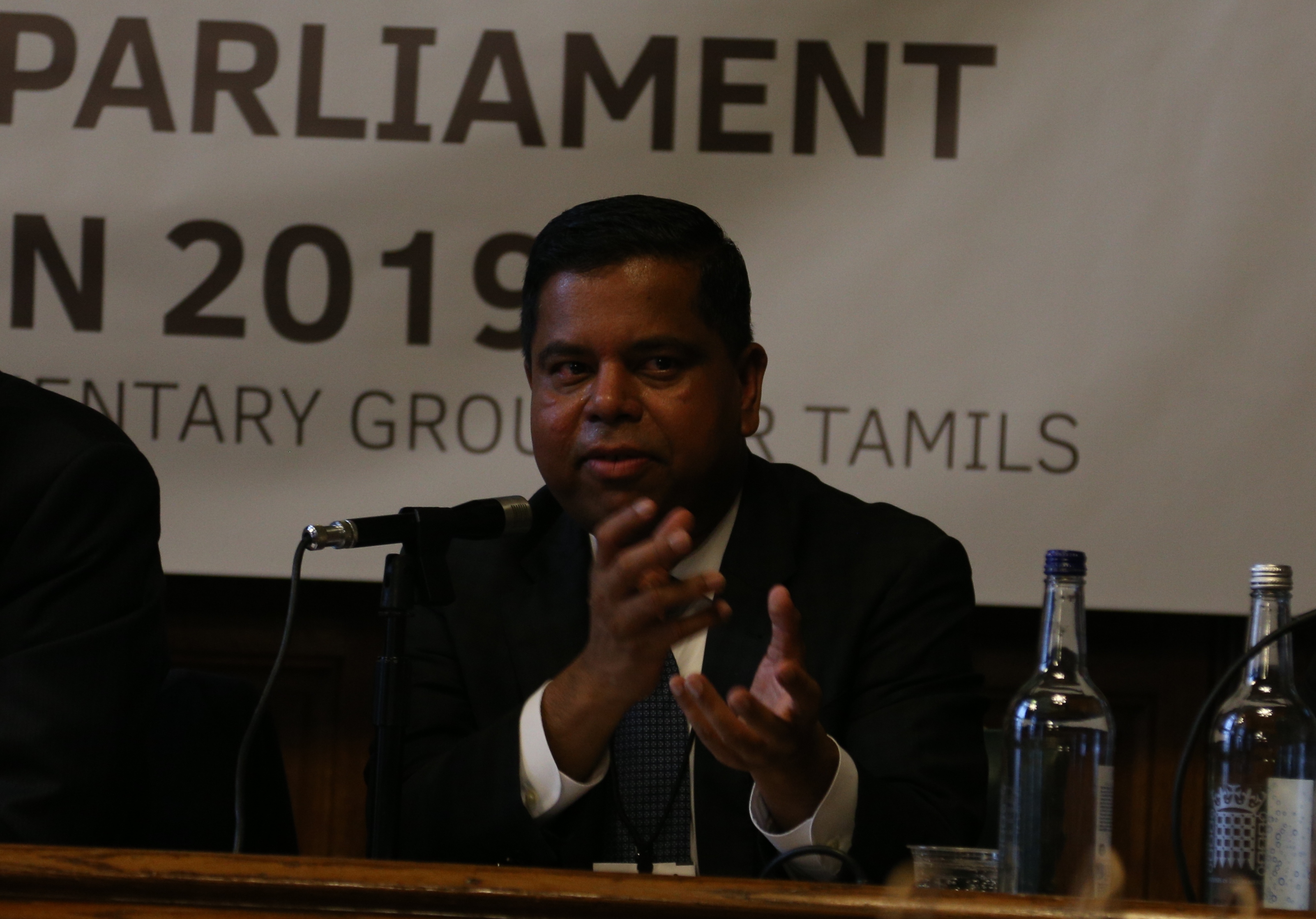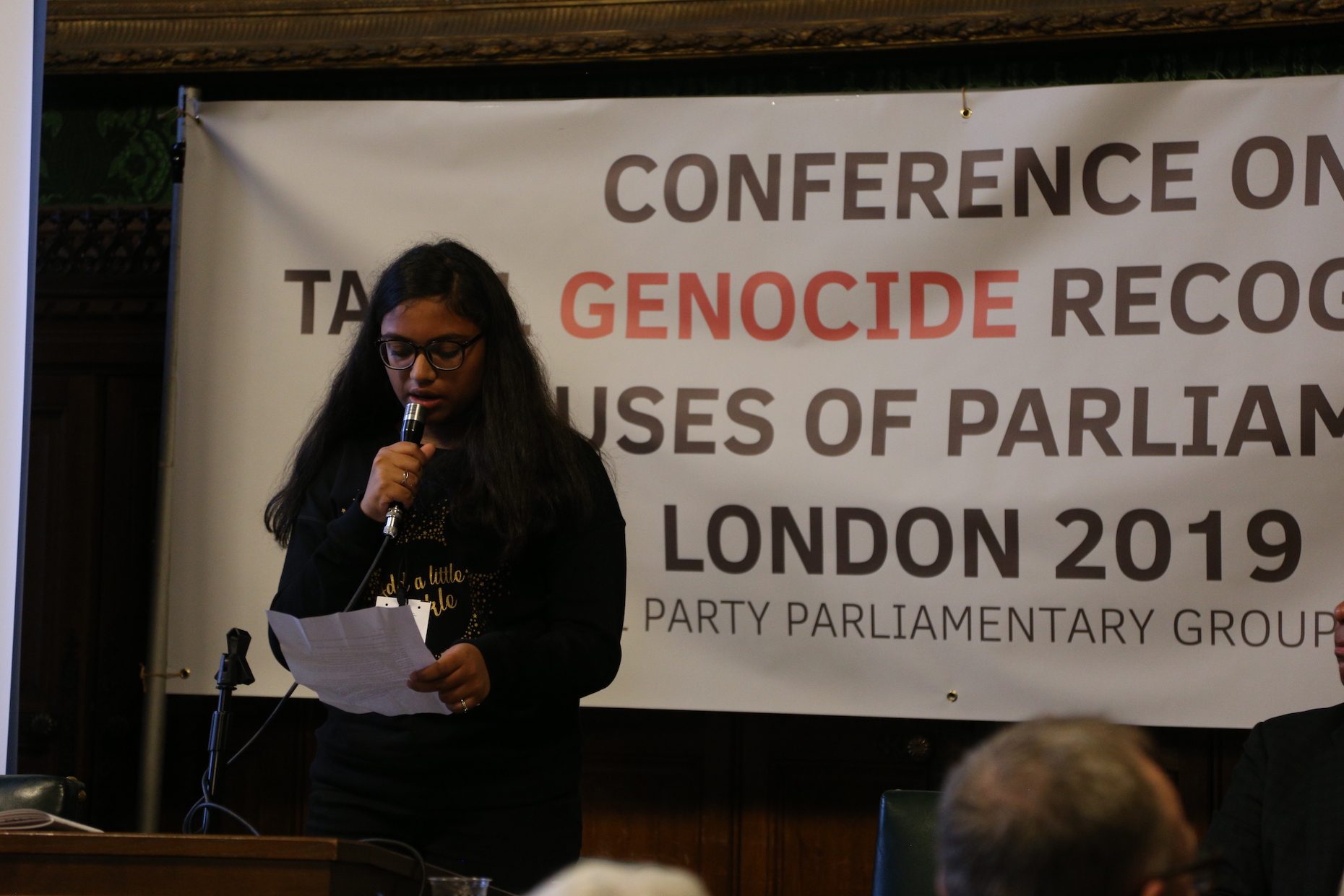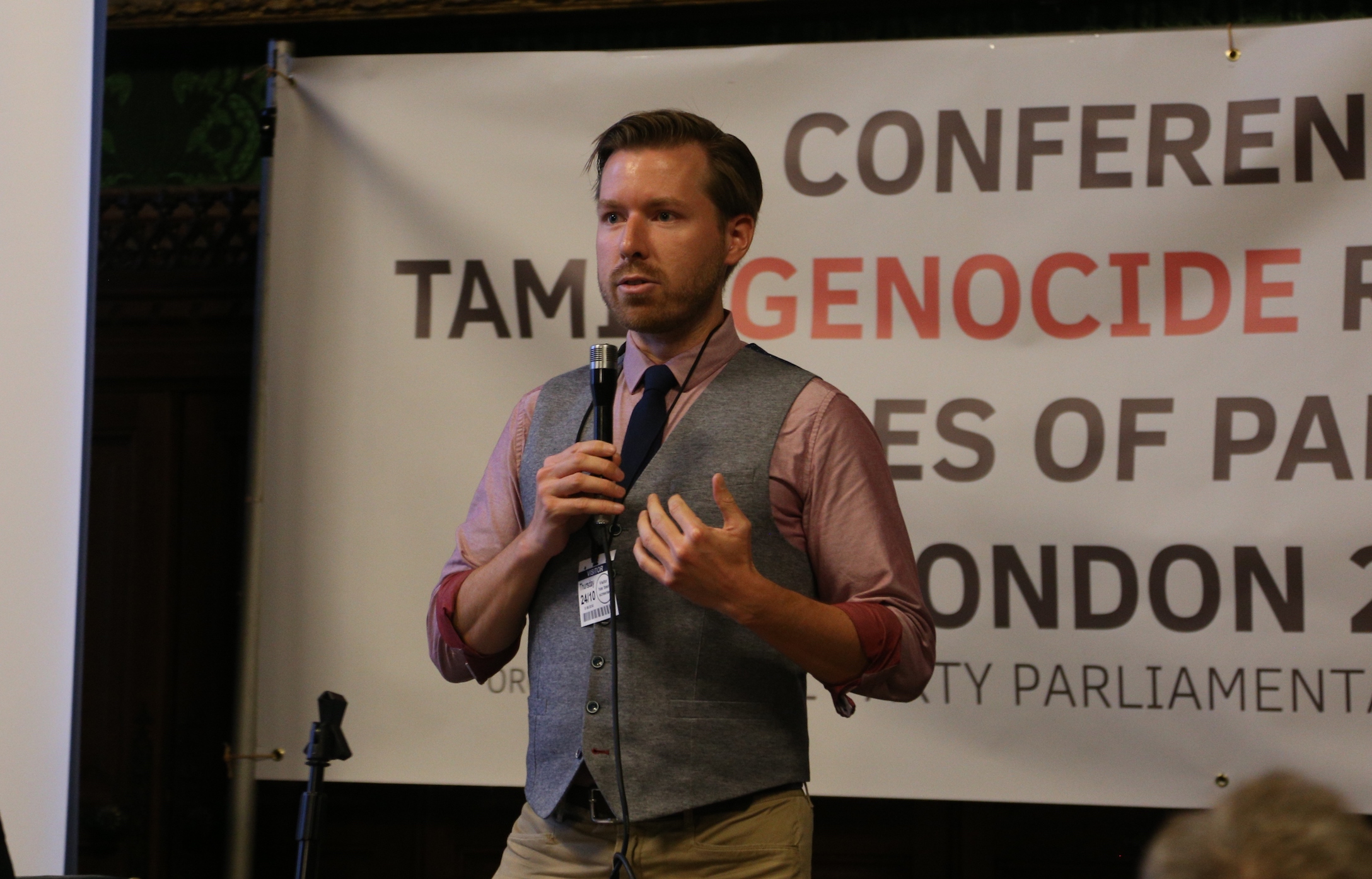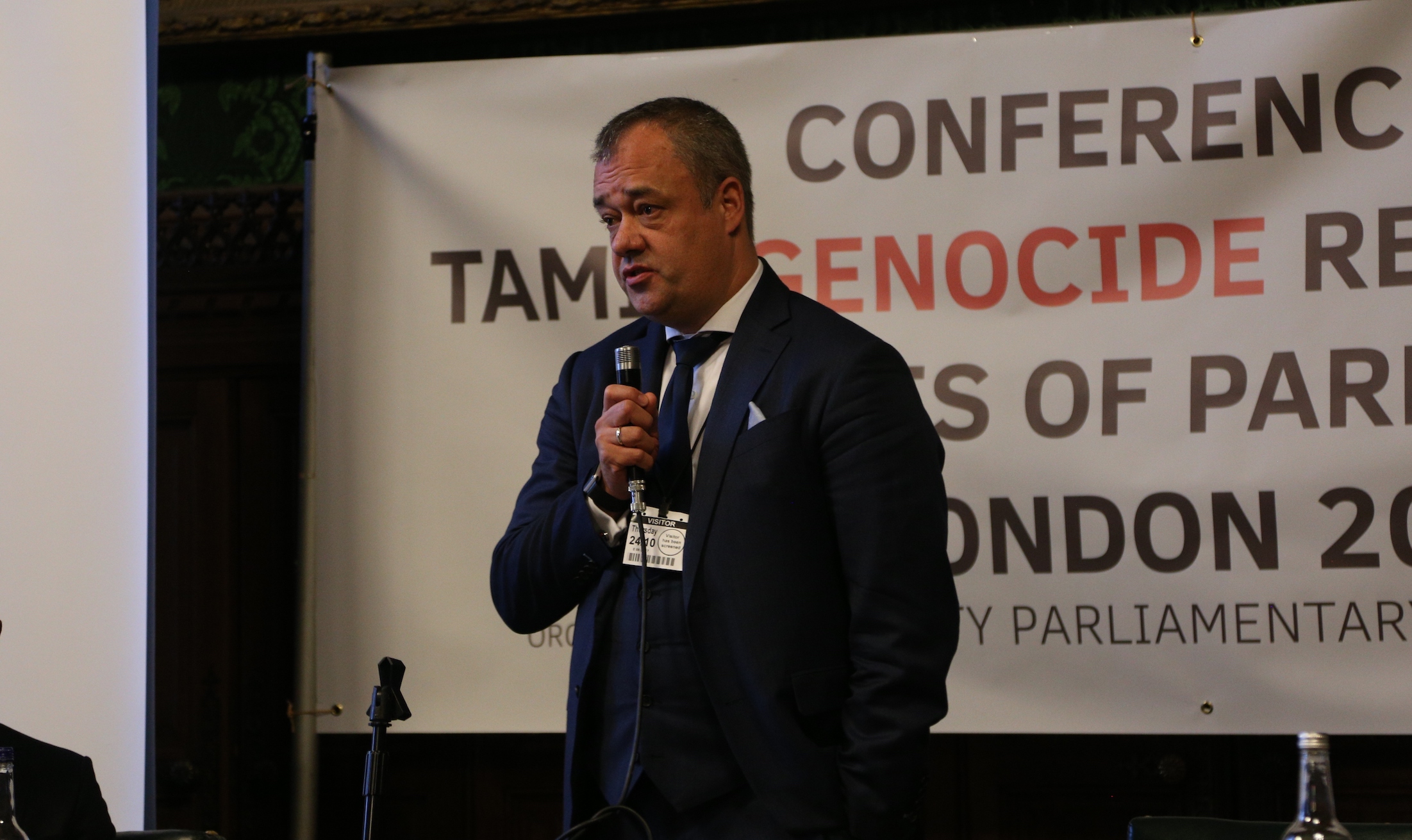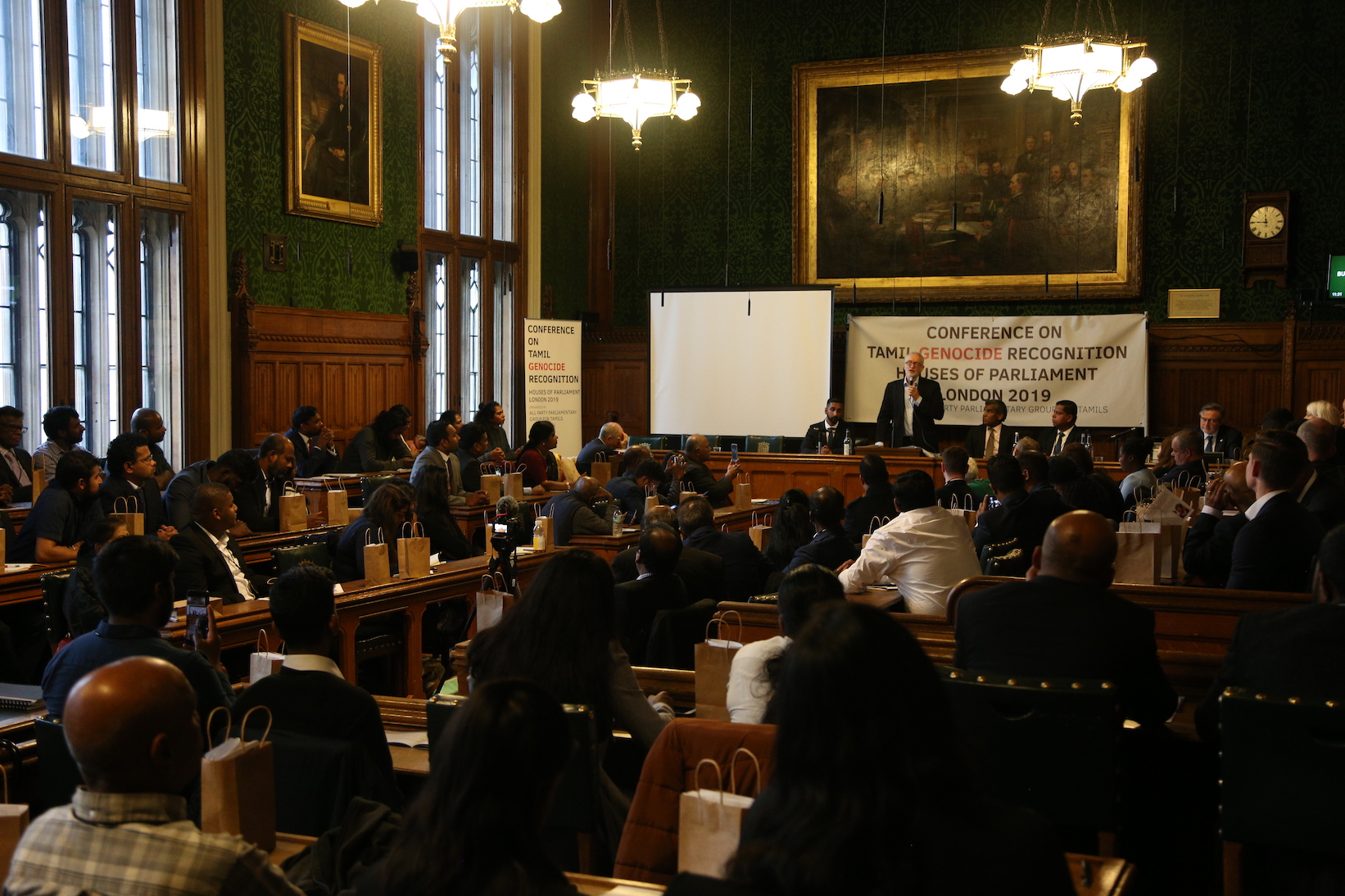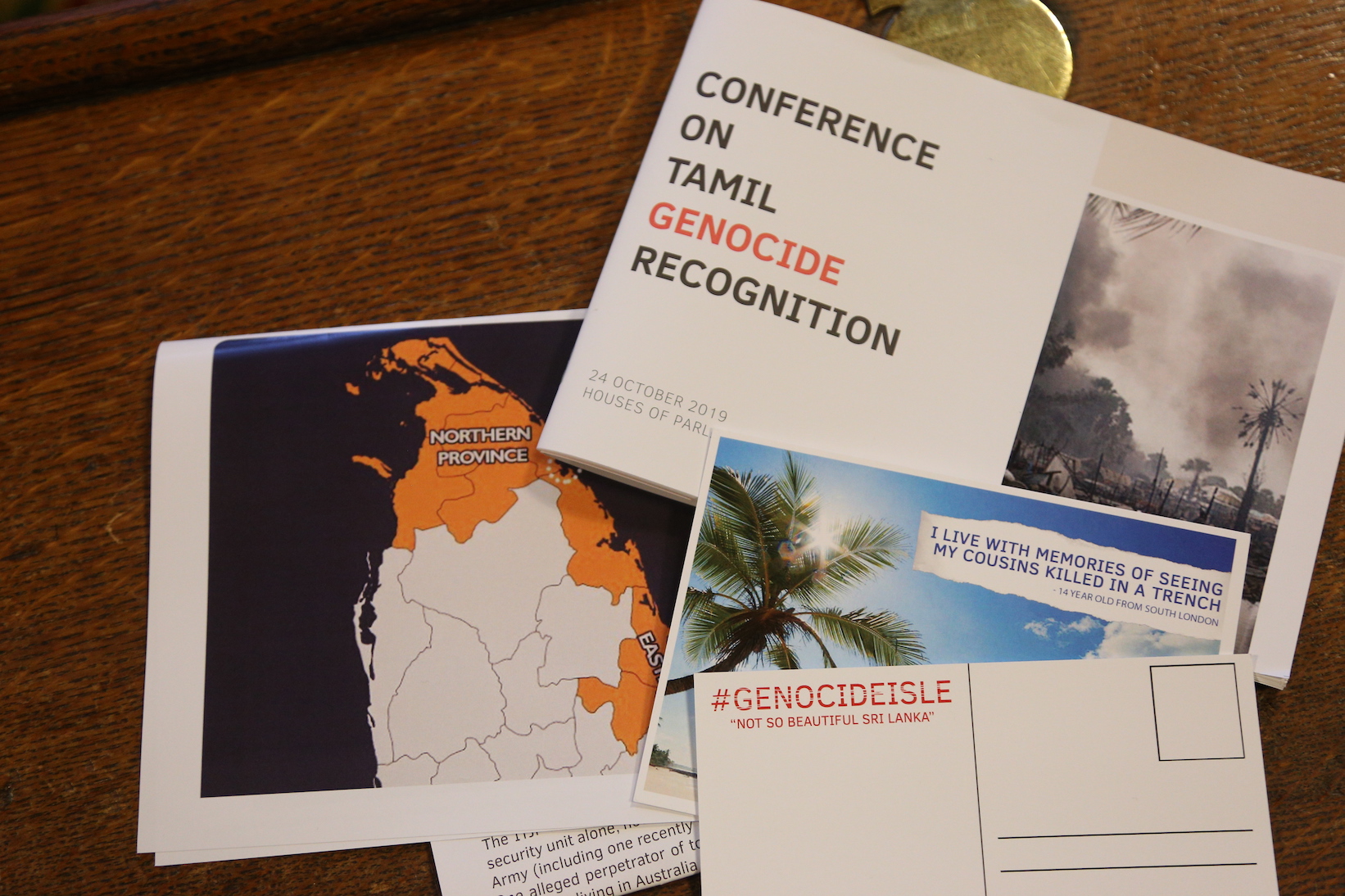All photographs by Tamil Guardian. Updated 1930 GMT.
On Thursday, the APPGT (All-Party Parliamentary Group for Tamils) hosted it's first-ever conference on Tamil Genocide Recognition in the Houses of Parliament were politicians from across the political spectrum voiced their support in obtaining justice and accountability for the massacres of Tamils.
The conference was well attended by MPs from all major political parties, including the current leader of the Labour Party Jeremy Corbyn, the former Conservative party leader, Iain Duncan Smith, and the Deputy Leader of the Liberal-Democrats, Sir Ed Davey. The conference also featured a number of eminent academic and legal experts including a panel featuring former UN Assistant-Secretary General Charles Petrie, former UN Special Rapporteur on Counter-Terrorism and Human Rights Ben Emmerson QC, current Member of Canadian parliament Gary Anandasangaree, and head of Together against Genocide, Jan Jananayagam.
Politicians speak up about Sri Lanka's record of atrocities
In his remarks, Jeremy Corbyn, Leader of the Labour party, spoke of what a Labour government would do to address human rights violations committed by the Sri Lankan government saying,
“I want to lead a government based on foreign policy dedicated to peace, justice, human rights and democracy […] If a country refuses to cooperate with the international community and the UN Human Right council, we have to look at our economic policy and international trade”.
He then said;
The big issues are investigating the crimes against humanity; the allegations of genocide that have been put, that need to be investigated; and, you will know that, following the Pinochet judgements in the courts of Britain, a crime against humanity anywhere in the world is a triable offence in British courts, in British law, it is an offence in UK law.
Corbyn also spoke about the need for demilitarization of the North and East, the repeal of the Prevention of Terrorism Act (PTA), and the pain of not knowing the truth about what happened for families of the disappeared.
"Tamils have been through some awful things," he told the audience. "You deserve answers. We must act in a way that will prevent this from happening again."
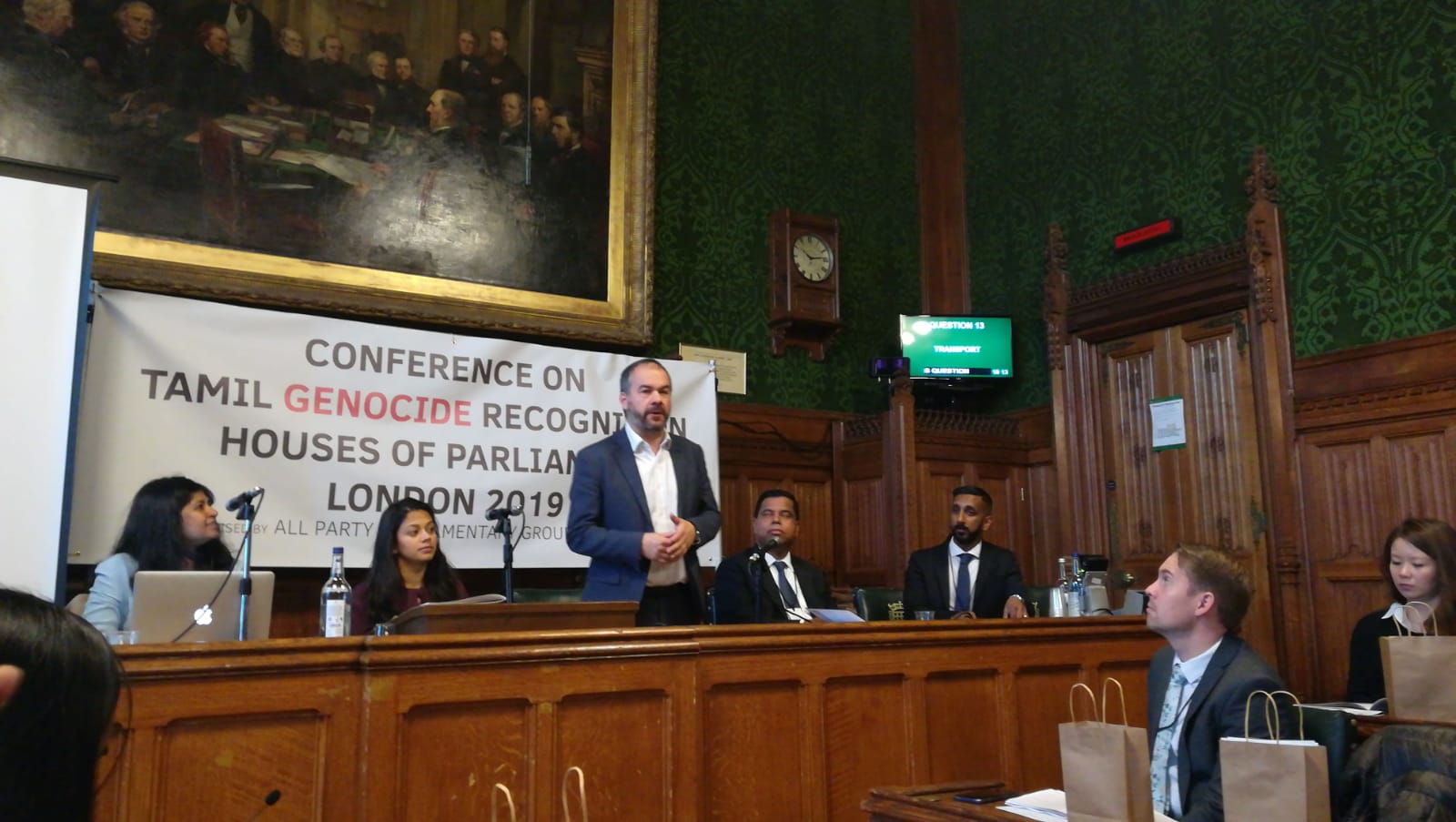
Opening the conference, Paul Scully, Conservative MP and chair of the All-Party Parliament Group for Tamils (APPGT), told the audience,
“In order to move forwards we need to look back, especially now on the 10th anniversary of Mullivaikkal. We need to reflect on the fact that it was a genocide... We are here for you to get closure for a dark period of the island’s past”.
Sir Ed Davey, Deputy Leader of the Liberal Democrats, recalling a visit to a Holocaust concentration camp and learning about the 8 steps of genocide and said, “I think [this] applies to the experience of Tamil people in Sri Lanka".
He explained that while had initially been hesitant about using the genocide label in 2009, as more and more evidence was unearthed of the atrocities that took place in Sri Lanka it became clear to him that it, in fact, was a genocide. He also noted his role advocating against restoral of GSP+ to Sri Lanka after 2009, and disappointment that this decision had been reversed in 2015.
Barry Gardiner, Shadow Secretary of State for International Trade and MP with the Labour party also spoke on the failure of the EU to ensure Sri Lanka was implementing the necessary human rights conventions upon which GSP+ was conditional. Speaking after a young Tamil woman's moving speech about losing her father in Mullivaikkaal, Gardiner reflected on his own experience of losing his father at a young age. Gardiner then reflecting on the Tamil struggle noting;
“There's more than one way to destroy a people: that extraordinary vicious bombardment, the corralling of people into what was supposed to be "safe zones". But also to make it systematically impossible for them to exist as a civil entity. It’s what we see in the North, through the military presence”.
Siobhain McDonagh, Labour MP and APPGT vice chair, called on Tamils not to become disaffected at the length of the struggle but to continue their efforts for accountability and justice.
Robert Halfon, Conservative MP and Vice President of the Jewish Leadership Council, powerfully closed off the conference saying:
"Ten years ago, there was another genocide in Sri Lanka. Humanity watched in silence. Tens of thousands stood outside this parliament calling for the onslaught against their family to stop […] Perpetrators have tried to close every avenue to justice and deny any atrocities occurred [... Tamils] have suffered very much and you have little support from around the world. It is extraordinary to see your strength and determination”.
Speaking to Tamil Guardian on the sidelines of the conference, Helen Grant, Conservative MP and former Vice-Chair of the Conservative Party, said:
“Although the war ended ten years ago, justice has still not been done […] It’s really, really, important that the international community are aware and never forget the atrocities that took place during that war like Mullivaikkal. They need to be reminded and whilst I welcome the various UN resolutions, there’s still so much more that needs to be done in terms of reconciliation, reconstruction and justice and human rights and that’s what need to fight for.
As Gladstone said, justice delayed is justice denied and we need to make sure justice is actually delivered”.
Gareth Thomas, Labour Co-operative MP, spoke to Tamil Guardian and said:
"Today’s event is important in underlying the seriousness of the situation. Over the last ten years there has been repeated and consistent evidence brought to light of human rights abuses at the end of the conflict... A demand for justice isn’t going away anytime soon and we need to put pressure on the Sri Lankan government through the UN to hold the perpetrators of these war crimes to account".
Other MPs present at the conference were Mike Gapes, Luke Pollard and Tom Tugendhat as well as Greater London Assembly member Keith Prince.
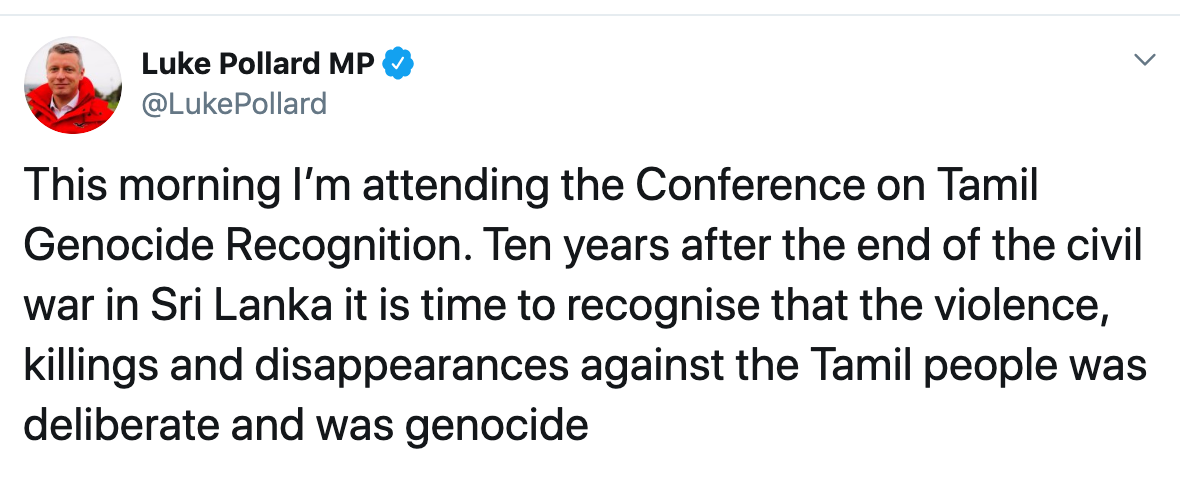
Expert panel and speakers all point to need for accountability and justice
Charles Petrie, a former assistant Secretary-General to the UN was part of a panel of experts speaking about accountability and genocide in Sri Lanka, which included Jan Janananayagam, Ben Emmerson and Gary Anandasangaree.
Petrie was the UN Deputy Humanitarian Coordinator during the genocide in Rwanda in 1994 and is also known for leading an internal review panel into the failings of the UN during the end of the Sri Lankan armed conflict. The report, released in 2012, highlighted significant failures on the part of the UN and has led to a campaign known as the 'Rights Up Front' campaign.
During Petrie’s remarks, he applauded the courage of the Tamil community to qualify the horrors in the Vanni and reflected on the failings of the UN.
“What lessons have been learnt? The common impetus is the lack of will to intervene. The Rwanda genocide started two weeks after the UN troops retreated […] It took hundreds of thousands murdered before the Security Council overcame its reticence to act in Rwanda. There has been the tacit acceptance of impunity”.
Petrie raised a number of important questions he thinks need to be considered in the sphere of international accountability including the failure to reform the UN and attributes some of this to “warlord type factions” within the vast bureaucracy of the UN's structure. He also argued that it may be wise for human rights advocates to try most to cluster the crimes of war crimes, crimes against humanity and genocide together, to effectively move on accountability.
Ben Emmerson QC, the former UN Special Rapporteur for Counter-Terrorism and Human Rights also spoke on the panel about his report on Sri Lanka. Reiterating the hard stance he took in his report, he noted that Sri Lanka had failed at accountability.
During his speech he criticised the militarisation of the North-East, stating that it was "effectively allowing for further internment" and took aim at Sri Lanka’s counter-terrorism measures, adding;
“Counter-terrorism legislation in Sri Lanka was targeted disproportionately towards the Tamils, to secure their economic and political isolation”.
Reflecting on the post-war landscape, Emmerson noted that the "underlying causes that festered the conflict need to be addressed” and said,
“There has been a complete failure by Sri Lanka to meet commitments to the international community”.
Jan Jananayagam, founder and head of Together Against Genocide, formerly known as Tamils against Genocide, spoke of the recurring pattern of anti-Tamil pogroms in Sri Lanka as well the final phase of the war. Throughout these campaigns, “whether or not they were successful, there was a clear intention to destroy”, she said.
Opening the panel, Jananayagam maintained that there are public statements where this was clear, stating,
“They had chosen the safe zone. They strategically drove the LTTE to the safe zone. The Defence secretary said ‘nothing should live outside the safe zone’ ”.
Concluding the panel and reflecting on the ten years since the end of the armed conflict, Gary Anandasangaree a newly re-elected Liberal MP from Canada and human rights lawyer said:
“We’ve just hit the tenth year mark of the end of the armed conflict in 2009 which left the Tamil community devastated and displaced […] Many of those who survived continue to seek justice and have to retell their stories over and over again to many international actors, NGOs and politicians almost to a point that there is retraumatisation for those trying to put their lives back together”.
Before becoming an MP, Anandasangaree was a practising lawyer and was instrumental in raising human rights violations that occurred during the Sri Lankan conflict at the UN and at other international forums. He was also recently part of a community effort which succeeded in bringing a motion to Canadian parliament recognising the Tamil genocide.
He further stated with respects to the international community and its response:
“There has been an abject failure on the part of the international community to address and prevent recurring genocides. With respect to accountability, important to look at the progression from the OISL report. Next steps to ensure some form of justice have been absent […]
Resolutions are a minimum threshold to appease the international community. The only light I've seen from the UN is to restrict Sri Lanka's capacity to contribute to peacekeeping operations. But this is limited".
Anadasangaree also spoke on the lack of hope within the Tamil community:
“The Tamil people continue to live in limbo without a political solution in sight. We don’t see an actual resolution, we don’t see a political pact that ensures the Tamil nation can survive on the island, haven’t seen any accountability on the island.”
He concluded his speech stating:
"The Canadian motion passed in June recognising Tamil genocide. It shows that the international community is ready to go to the next step... A warning to the Sri Lankan government that they need to act. Canada needs support from the international community, especially the UK that has a long history with Sri Lanka".
Following the panel, there was a powerful and moving speech by, 14-year-old, Kalaiyarasi Kanagalingam, who recalled the last day she saw her father, on May 17, 2009, in Mullivaikkal. See here for Miss Kanagalingam's full speech.
Christopher Tuckwood, executive director of the Sentinel Project, spoke briefly on the importance of genocide recognition;
"The reason why recognition is important for prevention, is that these events don't happen spontaneously […] They make a deliberate decision to attack a specific people at a specific point in time. If there's immunity the perpetrators feel more empowered to act.”
This was followed by Toby Cadman, the Co-founder of The Guernica Group, who said that there can be no justice without peace and no reconciliation without genocide recognition in Sri Lanka. He further stated;
“There is an enormous Tamil community and you need to come together to look at the documentation of war crimes and look at who can be arrested under universal jurisdiction”.
Read our live Twitter coverage of the day's proceedings here.
This article has been updated to include further details with regards to the parliamentarians and panellists who spoke at the event.

